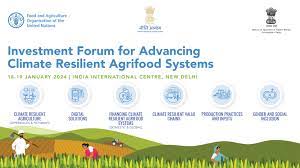Investment Forum For Advancing Climate Resilient Agrifood Systems:

The National Institution for Transforming India (NITI Aayog), the Ministry of Agriculture and Farmers’ Welfare (MoA&FW) of the Government of India, and the Food and Agriculture Organization (FAO) of the United Nations jointly launched the ‘Investment Forum for Advancing Climate Resilient Agrifood Systems in India’ in New Delhi.
Investment Forum for Advancing Climate Resilient Agrifood Systems in India:
- The initiative aims to create an investment and partnership strategy fostering climate resilient agrifood systems among various stakeholders in India.
- The Forum facilitated discussions and deliberations on six key areas namely,
- Climate resilient agriculture (experiences and pathways).
- Digital infrastructure and solutions.
- Financing climate resilient agrifood systems (domestic and global).
- Climate resilient value chains.
- Production practices and inputs for climate resilience.
- Gender mainstreaming and social inclusion for climate resilience.
- Climate change has profound implications for India, particularly affecting its economically vulnerable rural population, largely dependent on climate-sensitive agricultural livelihoods.
- Agriculture contributes to about 13% of total greenhouse gas emissions in India and is vulnerable to the impacts of climate change.
- Indian agriculture is susceptible to extreme temperatures, droughts, floods, cyclones, and soil salinity.
- Climate change can affect crop yields, water availability, soil health, pest and disease outbreaks, and food security.
- Climate resilient agrifood systems can help mitigate and adapt to climate change, enhance food production, reduce poverty, and improve livelihoods.
- Climate mainstreaming into agrifood systems necessitates larger investments from global climate finance, domestic budgets, and the private sector.




